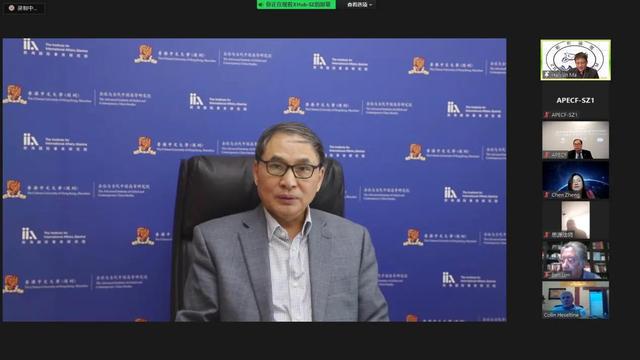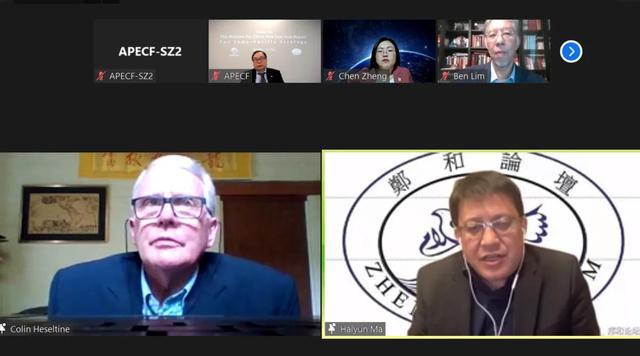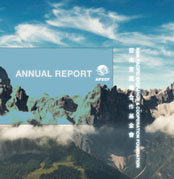December 15th, 2021
Asian scholars talk about “Indo-Pacific Strategy”
(From www.chinareport.com, Correspondent Li Chuanjun) At 14:00 p.m. on December 15, during the discussion of the third session of the international conference of “Indo-Pacific Strategic Dialogue”, East Asian scholars expressed their unique views on the “Indo-Pacific Strategy”, which was highly recognized by the participants.
Zheng Yongnian, the President's Chair Professor and the first Dean of the Advanced Institute of Global and Contemporary China Studies (GCCS) of the Chinese University of Hong Kong (Shenzhen), and Honorary Dean of the Institute of Political Economy, Shanghai Jiao Tong University, put forward three suggestions on how China should respond to the “Indo-Pacific Strategy”.

Professor Zheng Yongnian delivers a speech on “Indo-Pacific Strategy”
Firstly, we must avoid military competition. On the one hand, the United States is a world policeman, and it should be recognized in some aspects for making some contributions to the maintenance of world peace. On the other hand, when the United States feels that some countries are not in line with its interests, it will suppress them, not only China, including Middle East countries, Latin American countries, even its allies. The hegemony of the United States lies here. There are two main ways for the United States to mess up other countries. One is external military intervention to mess up regional order from the outside; one is to promote democracy from the inside. Once democratized, the United States has the opportunity and means to disrupt a country’s internal political order. This is the intention of the US president to hold a democracy summit recently. I think China should avoid military competition with the United States, because from the perspective of history, military contests have often been a lose-lose result. No country can win, and all are losers.
Secondly, I think China has the ability to turn the US military competition into economic competition. Through the policy of opening to the outside world, we can face up to economic competition with the United States. Under the leadership of General Secretary Xi Jinping, China has actually started it third opening-up. There are many new concepts of economic opening, and the new opening is called institutional openness. Why institutional openness? Because the nature of institution is eternal, we should ensure the eternal openness through institutional openness. There are also a lot of opening-up and practice in China, such as the construction of Shenzhen, Guangdong-Hong Kong-Macao Greater Bay Area and Hainan Free Trade Port, which are open economies with deeper and broader exploration.The Regional Comprehensive Economic Partnership signed by China, ASEAN and other countries has also begun to be implemented, which has a great impact on China and the entire regional economy. China has even begun to apply for accession to the Comprehensive and Progressive Agreement for Trans-Pacific Partnership. Although it will be a long process, it also shows China’s determination to open up.
Moreover, it is hoped that China will follow the trend to cope with the Indo-Pacific Strategy, because economic regionalization and globalization are still major trends. I think the Indo-Pacific Strategy pursued by the United States is against the trend, because its goal is to divide the Indo-Pacific region and bring down its economy, so I don’t think it will succeed. Fortunately, China has risen, and the United States can not stop China’s modernization process.

Colin Heseltin (left), former Executive Director of the Asia Pacific Economic Cooperation (APEC) Secretariat, participate in the “Indo-Pacific Strategic Dialogue”
Chen Zheng, Executive Director of Asia-Pacific Economic Cooperation and Development Research Center for School of International Journalism and Communication, Beijing Foreign Studies University, Benjamin Kang Lim, Senior International Consultant of Philippine, former Chief of Beijing Bureau of Reuter's News Agency, Shi Ri Zhao, Vice President of the Sangha Council of All India Bhikshu Maha Sangha in India and President of Cambodia-China Buddhist Association, Colin Heseltine, former Executive Director of the APEC Secretariat, Gombo Bumtsend, former Deputy Director-General of Department of Neighboring Countries of Ministry of Foreign Affairs of Mongolia, and other guests attended the third meeting os the “Indo-Pacific Strategic Dialogue”.
On December 14, Antony Blinken published the basic framework of the US “Indo-Pacific Strategy” in Jakarta, showing the intention to win over ASEAN and to alienate the relations between China and ASEAN. At the first two meetings of this strategic dialogue, ASEAN representatives expressed their own opinions that in the wrestling between China and the United States, ASEAN’s principle is not to choose sides. Including Mahathir Muhammad, former Prime Minister of Malaysia, Korn Dabbaransi, former Deputy Prime Minister of Thailand, Samdech Preah Mohessera Norodom Chakrapong: former Deputy Prime Minister of Cambodia; Professor Cheng-Chwee Kuik, Head of Centre for Asian Studies of Institute of Malaysian and International Studies at National University of Malaysia, and Sirajuddin Muhammad Din Syamsuddin, Chairman of the World Peace Forum, Religious Envoy of former Indonesian President Joko Widodo, all expressed ASEAN’s clear position on this issue.
The “Indo-Pacific Strategic Dialogue”, as the winter meeting of the “Asia Pacific Strategic Dialogue”, came to a successful conclusion today. Dozens of dignitaries, scholars and social activists from around the world expressed their views on the “Indo-Pacific Strategy” and delivered wonderful speeches, which attracted widespread attention all over the world. Xiao Wunan, Executive Vice Chairman of the APECF, one of the conference organizers, and Secretary General of the Asia Pacific Strategic Dialogue Organizing Committee, said that the “Indo-Pacific Strategic Dialogue” would continue, at the spring meeting in 2022, the “Indo-Pacific Strategy” will still be one of the options, and we look forward to the broad participation of people with breadth of vision.


 Back
Back